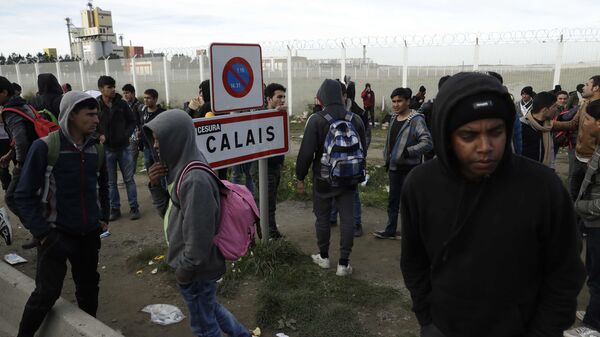Sputnik interviewed Marta Wallander, Director at the Refugee Rights Data Project, about the kinds of trials that refugees are facing in Calais, France.
Sputnik: What are conditions like in Calais now?
Marta Wallander: The current conditions are really dire. They're characterized by intentional sleep deprivation, by the authorities, with police officers waking refugees up in the middle of the night or early morning to chase them away from their sleep location. Spraying sleeping bag with tear gas or pepper spray, and basically confiscating sleeping bags, blankets, clothing shoes, and anything that keeps refugees remotely warm.
There's a number of fantastic grassroots organizations that provide food, drinking water, and certain sanitation resources for refugees, but despite that, the conditions are very dire, and of course, health conditions are very widespread.

Marta Wallander: The current situation in Calais drives people further towards traffickers and smugglers in order to get out of their current situation. I don't think that the current state response is targeting smugglers, or traffickers in any meaningful way. Rather making life more difficult for refugees in the area.

The current system is not working. There needs to be a thorough and long-term solution, where people are met with state support rather than intimidation.
Sputnik: What are some issues with the Dublin regulation? Is it a functional model?
Marta Wallander: Some of the individuals we are meeting in Calais may even have papers in places like Italy. But they find themselves in destitution without any support, or any access to financial support whatsoever, without the right to work. They then leave Italy to try and find a more viable situation elsewhere. So that's just one example of where the Dublin regulation just doesn't work. It doesn't practice.

Through fear of being deported back to their country of origin — where they might be prosecuted or perhaps the war is going on — refugees will instead try to find another way out, by heading down to Calais and trying to cross to the UK. There needs to be a thorough and long term solution, where people are met with state support rather than intimidation, where they are presented with alternatives.
Sputnik: What could be an appropriate response in moving forward?
Marta Wallander: The situation needs to be de-politicized, de-securitized. We need to see it for what it is. It is a humanitarian issue, with individuals really suffering in their current context, without any viable alternatives. The current response is characterized by high levels of police violence and inhumane treatment — it's not going to get us anywhere.



